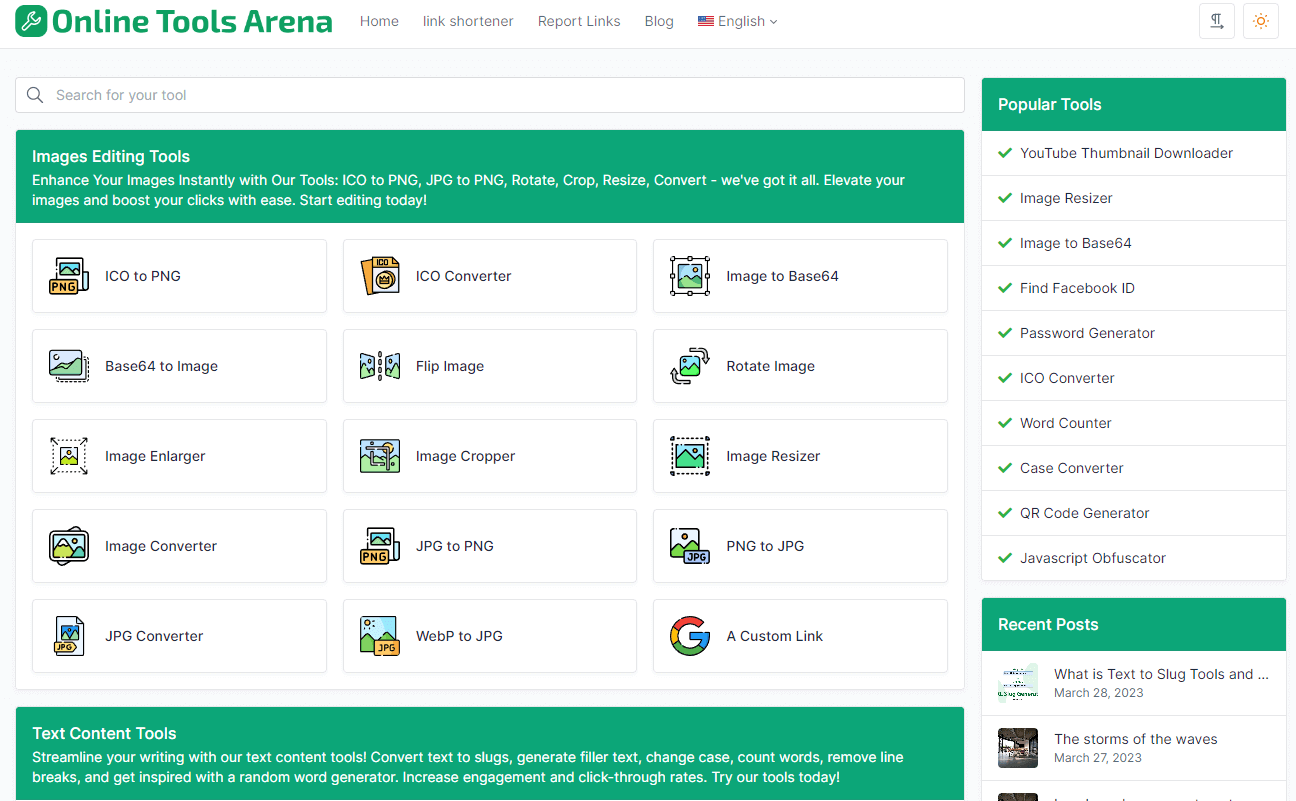
What is Text to Slug Tools?
Improve Your SEO with Text to Slug Tools: What They Are and How They Work

In today's digital landscape, search engine optimization (SEO) plays a crucial role in enhancing the visibility and ranking of websites. One important aspect of SEO is creating user-friendly and keyword-rich URLs, also known as slugs. In this article, we will explore the concept of text-to-slug conversion and its significance in web development and SEO.
When it comes to website optimization, every detail matters. URL slugs are an integral part of a website's structure and play a vital role in conveying information about the content of a page. By converting text into SEO-friendly slugs, web developers and content creators can improve the readability, accessibility, and search engine visibility of their websites.
The Basics of Slugs
What is a Slug: A slug, in the context of web development, refers to the portion of a URL that identifies a specific page or post on a website. It is a human-readable and SEO-friendly representation of the content's title or topic. Slugs are typically created by converting text strings into a format that is optimized for search engines and can be easily understood by users.
Examples of Slugs: Slugs find applications in various real-world scenarios. For example, in a blog post about "Top 10 SEO Techniques," the slug could be structured as "/top-10-seo-techniques." Similarly, for an e-commerce product page selling "Blue Nike Running Shoes," the slug might be "/blue-nike-running-shoes." These examples demonstrate how slugs can summarize the content of a page in a concise and descriptive manner.
URL vs Slug: What's the Difference: Although URLs and slugs are closely related, they serve different purposes. A URL (Uniform Resource Locator) is the complete web address that specifies the location of a web page or resource on the internet. On the other hand, a slug is a component of the URL that describes the content of the page in a user-friendly and SEO-optimized manner. While URLs can contain additional parameters and query strings, slugs focus on conveying meaningful information about the page's topic.
The Role of Slugs in Web Development: Slugs play a crucial role in web development by improving the usability, accessibility, and SEO performance of websites. They provide a clear and concise representation of the page's content, making it easier for users to understand and navigate through a website. From an SEO perspective, well-structured slugs can enhance a website's visibility in search engine results, leading to increased organic traffic and better rankings.
Technical Aspects of Slugs
Designing Effective Slugs: Creating effective slugs involves following certain best practices. It is essential to keep slugs concise, descriptive, and relevant to the content. Slugs should be easy to read and understand, both for users and search engines. Additionally, it is advisable to use lowercase letters and separate words with hyphens to improve readability and SEO performance.
Slugs in Editing Environments: Content management systems (CMS) like WordPress provide built-in slug functionality to streamline the process of creating and managing slugs. These editing environments allow users to customize the slugs of their web pages, ensuring that they are optimized for SEO. Users can edit slugs manually or rely on automatic slug generation based on the page's title or content.
Slug vs Title: While slugs and titles may share similarities, they serve different purposes. The title of a page represents the overall topic or heading of the content, while the slug focuses on creating a concise and SEO-friendly URL. It is important to strike a balance between creating a catchy and descriptive title and optimizing the slug for search engines.
Server-Side Slugs: In server-side environments, slugs are often used in routing and URL mapping. They help map user-friendly URLs to specific server-side endpoints or functions. By utilizing server-side slugs, developers can design clean and meaningful URLs that enhance the user experience and improve website performance.
Common Slug Problems and Solutions: While working with slugs, developers may encounter certain challenges. Common issues include duplicate slugs, special characters, and slug conflicts. To overcome these problems, developers can implement strategies such as appending unique identifiers to slugs, sanitizing input to remove special characters, and implementing slug generation algorithms that handle conflicts gracefully.
SEO and Slugs
Are Slugs SEO-Friendly: Slugs play a significant role in SEO as they contribute to the overall optimization of a website. SEO-friendly slugs that incorporate relevant keywords and accurately describe the content of a page can improve search engine rankings and attract targeted organic traffic. By optimizing slugs, web developers and content creators can enhance the visibility and discoverability of their websites.
Categorizing Slugs for SEO: Categorizing slugs can further enhance the SEO performance of a website. By organizing slugs into logical categories, such as by topic or product type, websites can create a coherent and structured URL hierarchy. This not only helps search engines understand the website's structure but also improves the user experience by making navigation more intuitive.
The Ideal Slug Structure for SEO: To maximize SEO benefits, it is important to structure slugs in a way that aligns with search engine algorithms and user expectations. This involves using relevant keywords, avoiding unnecessary words or characters, and keeping slugs concise and descriptive. By following these best practices, websites can improve their chances of ranking higher in search engine results.
Types of Slugs and Their SEO Impact: Different types of slugs can have varying effects on SEO. For example, static slugs, which remain consistent over time, can help establish a strong online presence and maintain consistent branding. On the other hand, dynamic slugs, which change based on the content or user input, can provide more flexibility but may require additional SEO considerations to ensure optimal performance.
How to Covert Text to Slug
Several online tools and software are available to assist in creating and converting slugs. These tools often provide features such as automatic slug generation, customization options, and SEO optimization suggestions. By utilizing these tools, web developers and content creators can streamline the process of creating user-friendly and SEO-optimized slugs.
"What exactly is a Text to Slug Tool?" you may ask. Essentially, it is a tool designed to take a section of the text, like a blog post title or article headline, and transform it into a URL-compatible slug. To illustrate, the phrase "5 Tips for Better Time Management" could be turned into the slug "5-tips-better-time-management".
Using Text to Slug Tools can save you a lot of time and effort when optimizing your content for search engines. Here's how to use one:
- Step 1: Choose a Text-to-Slug Tool There are plenty of Text-to-Slug Tools available online, both free and paid. Some popular options include the Yoast SEO plugin for WordPress, Slugify, and the Text to Slug Converter by Online Tools Arena.
- Step 2: Enter Your Text Once you've chosen your tool, simply enter the text you want to convert into a slug. This could be a blog post title, article headline, or even just a few keywords related to your content.
- Step 3: Choose Your Options Depending on the tool you're using, you may have the option to customize your slug in various ways. For example, you may be able to choose whether to include stop words (such as "a" and "the") or to separate words with hyphens or underscores.
- Step 4: Generate Your Slug Once you've entered your text and chosen your options, simply click the "Generate Slug" button to create your URL-friendly slug. You can then copy and paste the slug into the appropriate field on your website or content management system.
Using Text to Slug Tools for free forever from Online Tools Arena can save you a lot of time and effort when optimizing your content for search engines. By creating short, SEO-friendly URLs, you can help ensure that your content gets noticed by the right people and ranks well in search results. So why not try it and see how much easier it can make your content creation process?
In conclusion, understanding the concept of text-to-slug conversion is crucial for web development and SEO. By creating SEO-friendly and user-friendly slugs, websites can enhance their visibility, improve search engine rankings, and provide a better user experience. As the digital landscape continues to evolve, mastering text-to-slug tools and techniques will remain essential for web developers and content creators striving to optimize their websites for success.





